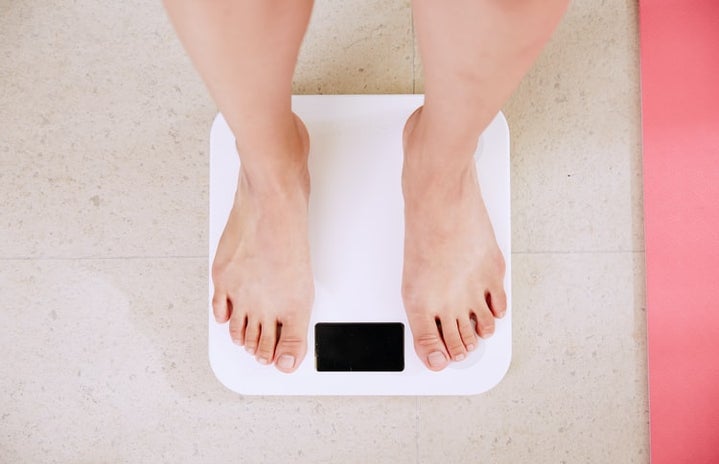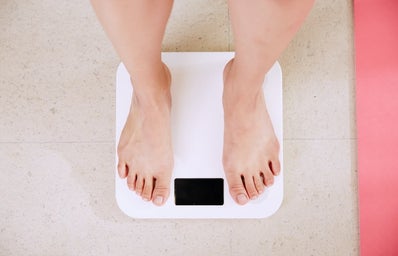Anyone who knows me knows about my complicated relationship with my body. I have lived with a variety of chronic illnesses since childhood, and I would consider myself to exist in the blurry middle ground between mid-size and plus-size since I predominantly shop in the straight sizes and can navigate the world with few restrictions due to not physically fitting into spaces built for the “average” person. This has made my journey to find any acceptance of my abilities and appearance, whether it aligns more with principles of body positivity or neutrality, a long and arduous one that I am far from completing, even though I can recognize where I’ve made strides.
New Year’s can be a triggering time for me and anyone else in a similar boat—we’re constantly facing messaging from advertisers, influencers, and society at large that now is the time to hit the gym, count calories, and cut out foods that might impede our goals, illustrating our current bodies as “Before” images that need to be in constant pursuit of a slimmer “After.” Weight loss, improved fitness, and improved diets consistently rank in the most popular resolutions, and while these aren’t inherently bad, the methods through which these goals are sought are often unhealthy. Combine that with the fact that the weight loss industry is estimated to be worth anywhere between $3.8 billion to $470 billion, yet 80% of people who lose weight are unable to sustain their weight loss for more than a year, and the picture that remains is a grim one indeed, one that continues to be painted at the start of each new year.
Mal Lynne, a body positive exercise physiologist who describes herself as the “anti-Jillian Michaels” and has a TikTok account with 121.8k followers, describes January 1st as “Black Friday for diet and fitness industries,” when they ramp up their campaigns to attract people of all shapes and sizes who view themselves as needing to “get fit,” which often ultimately translates into becoming smaller. This is the first year where the work I’ve done to unlearn my belief that my body is “bad” has allowed me to divest from the pressure to lose weight in the new year, but even then, I occasionally feel prickles of influence to spend money on weight loss “solutions.”
I recently found photos of myself from a backup of my mom’s camera roll in 2014, when I was in the eighth grade. My hair and my fashion choices are truly irredeemable, but what stunned me most was my body. I started developing around the third grade, which came with pretty rapid weight gain that decimated my self-esteem in the subsequent years. In my memory, I was always significantly larger than all of my peers, and I remember trying to conceal my hips and stomach with oversized shirts yanked down as far as they would go. My school’s uniform policy dictated that we tuck our shirts in, and being the ultimate goody two shoes, I complied even though it made me borderline nauseous. The cooler months allowed me the relief of wearing a cardigan, but in a specific photo from early August, I’m standing at the bus stop dressed in skinny khakis and a navy polo shirt. And I’m objectively thin.
I don’t know my exact weight or proportions, and I don’t have any clothes from that time period that I can check the labels of, but there’s no way I could be anything more than a size eight. I don’t believe that being a size eight, or being any size for that matter, is a marker of superiority or inferiority, but I distinctly remember perceiving my body as larger than it appears in these photos. I won’t lie and say that I didn’t experience jealousy over the fact that I once looked a way that I now view as unattainable, but more than that, I feel sad. I feel sad that at thirteen years old, I was so preoccupied with being as thin as the girls in my class that I restricted myself from things like swimming, taking pictures, and going to school dances, all because I thought my body was an embarrassment. It wasn’t, and it isn’t now, but there was none of the emphasis on “all bodies being good bodies” that exists in this day and age. I didn’t stand a chance against a multi-billion industry telling me I wasn’t enough unless I was as small as could be.
It’s okay to want to initiate change in your life, whether that’s in regards to your body, your body image, or any other area of your life, but you don’t need to wait for a new year, and you don’t need to listen to companies trying to get you to buy something from them and increase their profits. The weight loss industry in particular is quite insidious, but this doesn’t mean we’re all helpless in the face of it. Familiarize yourself with the principles of body positivity and neutrality with books and podcasts, follow social media creators who make content that helps people unlearn what they’ve been told about their own and other people’s bodies, and engage in therapy if that’s a resource that’s available to you. When people in your life say things that reinforce body hierarchies, interrogate them with curiosity and the knowledge that this may not be a journey they’ve started yet. It’s not fun to know that the majority of people still ascribe to traditional views of thin being good and fat being bad, but all revolutions begin with baby steps, and what better time to get started than in the new year? (Just kidding. Start whenever you can.)


